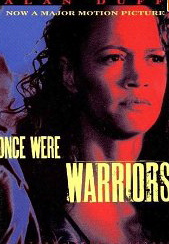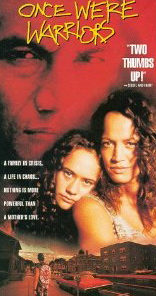The Maori urban life that New Zealand tourists never see.
In a narr ative so hard-hitting that the viewer actually feels battered by the time the book reaches its conclusion, a Maori family with five children must deal with urban violence, poverty, drugs, alcoholism, unemployment, gang warfare, rape, physical and mental abuse, suicide, and a host of other horrific family problems, all depicted graphically. Beth and Jake Heke and their five children, along with numerous other Maori families, live in an urban ghetto of government-supported housing, isolated from the rest of society and isolated, too, from their old rural culture, which once gave pride and a sense of identity to Maori families. Here in the city the prevailing “culture” centers around bars, rather than the ancient meeting houses.
ative so hard-hitting that the viewer actually feels battered by the time the book reaches its conclusion, a Maori family with five children must deal with urban violence, poverty, drugs, alcoholism, unemployment, gang warfare, rape, physical and mental abuse, suicide, and a host of other horrific family problems, all depicted graphically. Beth and Jake Heke and their five children, along with numerous other Maori families, live in an urban ghetto of government-supported housing, isolated from the rest of society and isolated, too, from their old rural culture, which once gave pride and a sense of identity to Maori families. Here in the city the prevailing “culture” centers around bars, rather than the ancient meeting houses.

Beth Heke, the mother, loves her violent husband Jake, despite his physical abuse of her when he is drunk, and she cares deeply about her children, but she is powerless to protect them or herself from Jake’s rages. The oldest son is part of a street gang which covers their faces in traditional tattoos and uses their own violence for protection against others. Their sensitive second son Boogie has been arrested for associating with car thieves.
Most touching, however, is Gracie, a thirteen-year-old who is trying to lead a good life without any good examples to follow. Pathetically, she and the two youngest children are forced to “grow up early,” accepting the horrors of their lives as “normal,” while they try to survive any way they can.
Alan Duff’ s bold, raw language helps to bring this powerful, absorbing, and overwhelming story of human misery to life. He stresses the differences between contemporary Maori urban life and traditional Maori culture, and shows the sweetness of Gracie against her grim living conditions and the even worse conditions of her best friend Toot. Throughout, Jake’s violence emphasizes how close to the edge the entire family lives.
s bold, raw language helps to bring this powerful, absorbing, and overwhelming story of human misery to life. He stresses the differences between contemporary Maori urban life and traditional Maori culture, and shows the sweetness of Gracie against her grim living conditions and the even worse conditions of her best friend Toot. Throughout, Jake’s violence emphasizes how close to the edge the entire family lives.
Dramatic and as powerful as a punch in the face, this novel is a searing indictment of government warehousing of families and separation of those who need their culture to survive and succeed, at the same time that it is also sensitive to the need to provide help for those who have no other resources.
Notes: The author’s photo appears on http://www.stuff.co.nz
